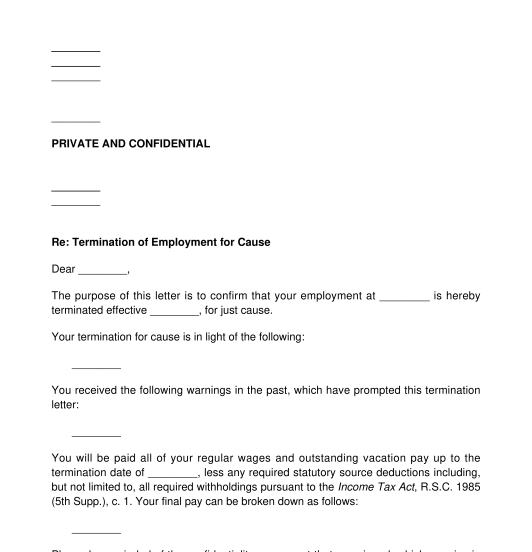 03/11/2025
03/11/2025

Answer a few questions and your document is created automatically.

Your document is ready! You will receive it in Word and PDF formats. You will be able to modify it.

 03/11/2025
03/11/2025
 Word and PDF
Word and PDF
 1 page
1 page
A Termination Letter to Employee for cause is a letter sent to an employee advising them that they are being terminated for just cause. Certain examples of termination with cause include:
Termination letters can take various forms, which primarily include the following:
Yes. Having a termination letter is required in order to terminate an employee for cause. A termination letter is an important document that may be required in the event of a lawsuit. The document highlights the reasons for termination and the official date on which termination is effective. A termination letter can provide clarity and serves as a written record of the events that resulted in the employee's dismissal.
The letter should indicate to the employee that they are being fired (terminated for cause), that any outstanding wages owing will be paid, and that all work-related matters must remain confidential.
Additionally, the employer should specify the reason for dismissal as this provides greater clarity to the employee being terminated.
The employer or their representative sending this letter should provide specific details about the warnings that the employee received prior to being terminated.
Prior to sending a Termination Letter to Employee for Cause, it's important for the employer to have disciplined the employee progressively and to have provided warnings regarding their behaviour or performance which has resulted in the termination. Otherwise, the employee may file a claim for wrongful termination to obtain severance pay. If, after the employer has taken the appropriate steps to place the employee on notice, and the employee still does not comply, a termination letter may be warranted.
After the letter is ready, the employer or a person of authority such as human resources or a supervisor will send this letter to the last known address of the employee, to their email address, or by any means of delivering the letter to the employee. This will advise the employee that they are being terminated for breaching workplace policies.
The employer should keep a copy of this letter in the employee's file for documentation purposes.
No. Registering the letter is not necessary. However, the employee's record of employment will need to be updated with Employment and Social Development Canada through Service Canada. This means that the government must be notified that the employee no longer works for the employer.
In Canada, employment relationships are governed by legislation and case law. Different laws will also apply depending on whether or not the employee is represented by a union. These laws govern the relationship between employer-employee and set out the parameters of what is allowed and what is not, including termination notices. For employees who don't have a union, the termination notice may be contested by filing a lawsuit for wrongful termination. The deadline is normally two years.
If employee misconduct in the workplace was not severe enough to warrant outright termination, then proof of warnings should also be highlighted in this letter. This shows that the employer repeatedly warned the employee about their conduct. In other words, the progressive warnings have led the employer to terminating the employee. The following pieces of legislation govern employment law:
You fill out a form. The document is created before your eyes as you respond to the questions.
At the end, you receive it in Word and PDF formats. You can modify it and reuse it.
Termination Letter to Employee for Cause - Template
Country: Canada (English)